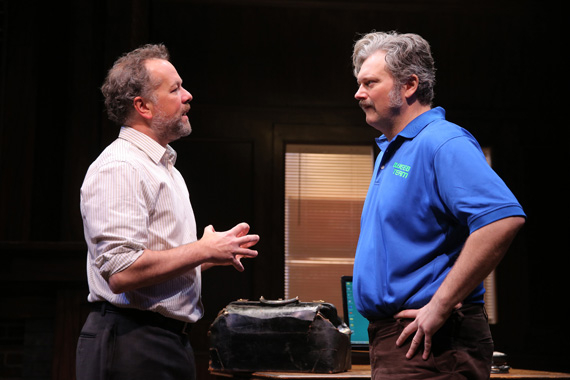The (Curious Case of the) Watson Intelligence

(© Joan Marcus)
Who among us is prepared to break up with our smartphones, tablet computers, and various iDevices? As these electronics become ever more integral to our daily functioning, there’s an increasingly fine line between assistance and dependence. Playwright Madeline George (The Zero Hour) brings us up close and personal with that line in The (Curious Case of the) Watson Intelligence, now making its world premiere at Playwrights Horizons. This fast-paced, genre-defying play is certain to get your mental gears turning.
It all begins with a telephone ring, a jingle-jangly old-timey ring. This gives way to a high-pitched rotary ring, a digital cordless ring, and finally, the ubiquitous smartphone marimba. Not only is this an eloquent way to remind us to turn off our phones (the theater is one of the few places where we do so), it establishes the world of the play from the get-go.
George has written a play of incredible scope yet remarkable efficiency. Taking place variously in 1876, 1889, 1931, and 2011, the scenes jump back and forth, even if the characters feel quite similar. First there’s Watson (a perfectly cast John Ellison Conlee), the reliable assistant to great men. A timeless archetype, he’s the laboratory assistant to Alexander Graham Bell, the chronicler of Sherlock Holmes, a robotic Siri-like assistant, and a middle-aged tech guy on the “Dweeb team” who travels around fixing computers for hot-headed baby boomer Tea Partiers like Merrick (David Costabile, who delivers thrilling middle-aged-white-man tirades with emotional gusto and exquisite diction). In 2011 Merrick is running for city auditor on a platform to dismantle the government. He’s convinced that his ex-wife, genius robotics engineer Eliza (Amanda Quaid) is plotting a major move against him during his campaign, so he hires Watson to spy on her. Unexpectedly, this violation of privacy leads to a full-blown love affair.
Meanwhile, back in 1889, Eliza seeks the help of famed private detective Sherlock Holmes at his Baker Street residence, but finds only his assistant: the steadfast-but-not-particularly-brilliant Watson. She’s concerned about the erratic behavior of her husband, a paranoid and brilliant inventor named Merrick. Are you noticing a pattern?
These archetypes fly through time and space, landing on the stage to dance the same dance they’ve been performing since time immemorial. Of course Watson is consistent, always there for you, but is he too predictable? Is “predictability” even what we’re looking for in a mate? Or could such dependability actually spawn dependence, something that would be hard to break and ultimately deleterious to a creative person like Eliza?
For her part, director Leigh Silverman keeps this complicated web of characters and locations from crossing wires in confusing ways (no small feat). Anita Yavich lends a hand with her authentic and infinitely practical period costumes: Several times actors change clothes right in front of us, switching character with the placement of a cravat or other such accessory. Louisa Thompson’s set consists of a moving centerpiece that alternates as a fireplace and bed. As that rises and falls through the stage, a complex system of curtains zips around a track, like a toy-train set, speeding up what are already lightning-quick scene changes.
Still, despite all the time saved on transitions, this 140-minute play feels about a half hour too long. It also doesn’t seem to know how to end: One scene in which two characters (Thomas A. Watson and Eliza) share profound insights about life gives way to another such resolution between Eliza and Merrick, which seems superfluous. When you open up so many doors, it’s very difficult to close them again.
In that sense, The (Curious Case of the) Watson Intelligence suffers from the thing that makes it so thrilling in the first place: its sheer ambition in tying together people and stories across the ages to reach a larger conclusion about humanity.
Still, it leaves you with plenty to chew on, mostly concerning our relationship with the electronic tools that have simultaneously made our lives easier and enslaved us to their competence. It makes a nice companion to Anne Washburn’s Mr. Burns, A Post-Electric Play, which appeared at Playwrights Horizons earlier this season and imagined a future without such devices.











